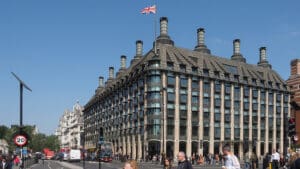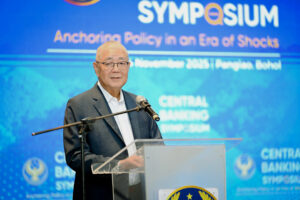THE Bangko Sentral ng Pilipinas (BSP) said its P500,000 cap on cash withdrawals to make large kickbacks from infrastructure projects more traceable was arrived at following due study and consultation with the banking industry.
“It wasn’t a knee-jerk reaction,” BSP Deputy Governor Zeno Ronald R. Abenoja told BusinessWorld on the sidelines of a Senate hearing on Thursday. “It was well-considered. We looked at other countries’ experiences. So, it was carefully thought out… and we did consult the banks, the feedback that the banks were getting from their clients and among themselves.”
Sen. Francis Pancratius N. Pangilinan had asked the Senate plenary if the regulation was a knee-jerk reaction to revelations that nearly P500 million in cash was withdrawn over two days by contractors linked to the flood control scandal.
Mr. Pangilinan also said he has received complaints from banks, depositors and small businesses about the P500,000 cap.
“A lot of banks, a lot of depositors, (and) small businesses are saying suddenly it’s so difficult to transact with the banks because there is a limit of P500,000,” he said.
In September, the BSP issued a circular imposing a P500,000 daily limit on cash withdrawals, including the total of multiple transactions.
Clients seeking to withdraw more than P500,000 will have the burden to submit documents proving that the cash withdrawals serve a legitimate business purpose.
Mr. Abenoja also noted that the BSP guidelines mirror the provisions of the Anti-Money Laundering Act (AMLA) and other central bank regulations.
“The guidelines… iterate what is already in the AMLA,” he said. “Because under the AMLA, banks are required to do enhanced due diligence. And one form of that is to require or ask for supporting documents to make sure that legitimate transactions underlay their transactions with the banks.”
AMLA requires covered persons, including banks, to file suspicious-transaction reports to the Anti-Money Laundering Council within five working days from its occurrence.
Sen. Sherwin T. Gatchalian, who heads the Senate finance committee, said then-Finance Secretary Ralph G. Recto sees the measure as a “possible” factor behind the slowing growth in the third quarter.
“Secretary Recto was saying this is possible,” Mr. Gatchalian told the plenary. “And also moving forward, it can also create some negative effects.”
“The BSP acknowledged this, and they are now reviewing this policy,” he added.
Mr. Abenoja said the central bank’s Financial Supervision Sector and Office of the General Counsel and Legal Services are handling the review of the regulation.
“It’s ongoing,” he said. “We don’t know yet what will be the final outcome. But the BSP is considering all these inputs.” — Katherine K. Chan


















